Home Page
February 22
February 23
February 24
February 25
February 26
Parchman Prison
Farm (Today)
Jackson, Mississippi
Bob Moses
-The Algebra Project
February 27
February 28
March 1
March 2
March 3
Itinerary
Aknowledgements
Afterwords
|
|
Tuesday, February 26
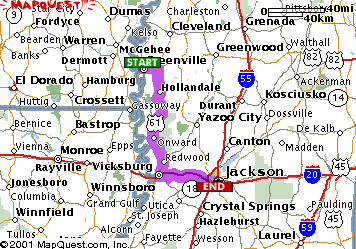
Get On the Bus 2002: Day 5
- Mississippi State Penitentiary (Formerly
the Parchman prison farm).
- Drive to Jackson, Mississippi - 132 Miles
-
Meeting with Bob Moses at Lanier High School in Jackson
Mississippi.
- Meeting with David Dennis, a former Freedom Rider, CORE
field secretary, and friend of Bob Moses.
Message
from Joe Gonzalez, trip leader:
The day dawned cold and sunny in Cleveland, and we set
out for Parchman Prison Farm with our guide Luther Brown.
As many of you know, the State of Mississippi imprisoned
many Movement activists at Parchman during the 1960s.
After lunch in the prison canteen, we drove to Jackson to
talk with Bob Moses, father to both Freedom Summer (1964)
and the Algebra Project (1982). Following our chat with
Mr. Moses, we met David Dennis, director of the Algebra
Project's Southern Initiative, following a career as a
Freedom Rider and CORE Field Secretary in Mississippi. We
spent to the night in Jackson, and rested for another
early morning.
Mississippi
State Penitentary (Formerly Parchman Prison Farm)

The
entrance gate to the Mississippi State Penitentiary.
Cameras were not allowed on our tour, where we were able
to see Mississippi's state gas chamber and table for
lethal injections. The last execution in Mississippi was
here in 1985.
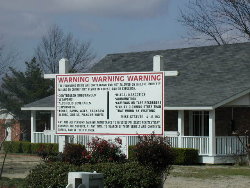
We
had to leave our cameras and hack saws at the front gate.
Journal
entry from Sarah Alloy's journal about Parchman:
... The guards talk to us for a while here, answering
questions and discussing procedures. After this we load
into a rusty old bus that smells of cigarettes and men
and head off to see the farm. We drive past house
compounds and other buildings, stopping to see one old
inmate, Horace. He comes onto the bus and begins to
lecture us about staying away from drugs and alcohol,
about staying on the right track. He is old and frail
looking, although I have a feeling he is strong
underneath the fašade. He tells us of how he has a glass
of milk and peanut butter and jelly sandwich every night.
He tells us that he has not had alcohol or anything of
the sort in years. After he goes back to his house, we
ask the guard what Horace, this nice, wise old man, has
done to be on "The Farm." After pondering for a
moment, the guard looks us over and says, "I suspect
ole Horce's here for murder. This is his third or fourth
time in." It is at this time we learn that at the
Mississippi State Penitentiary, prisioners are not
classified by crimes, but by behavior. ...
... The old death chamber itself is a gas chamber. It
looks like a giant steel egg, like the kind of thing they
would have used on 20,000 Leagues Under the Sea to scour
the ocean floor. It stretches from floor to ceiling, with
a large ventilation type pipe screwed in at the top.
Inside there is a leather seat and various straps. The
front of the door shuts with a giant wheel, reminiscent
of an old bank vault mechanism. They no longer use the
gas chamber, however. The new form of Capital Punishment
in Mississippi is to be lethal injection. I have a strong
desire to sit in the gas chamber, a feeling I cannot
explain.
They take us into the next room, showing us the new
lethal injection table that has yet to be used. It is
long and has many straps-across the chest, legs, arms,
wrists, ankles and head-and three tubes extend from the
table back through the wall behind it. Again I have a
strong desire to be strapped onto the table, for
empathetic purposes I think. I do not bother to ask if I
can actually get on the table, but experience a momentary
vision of myself laying there, strapped in, speaking my
last words to the melting pot's mix of reporters,
victim's families and my family. I feel regret coursing
with the chemicals through my veins (would it hurt?) and
then darkness as death takes over ...
Excerpt from Alyson Scott's journal on Parchman:
. . . Today
has been a long day. We woke up at 7:30 and pretty much
have been going until now-and it's 12AM.
We first visited Mississippi State Penitentiary, formerly
Parchman Prison Farm, and I found it to be my favorite
stop so far on the trip. The complex is immense, spanning
over 23,000 acres. The land is farmed by the inmates and
they consume the produce they create. We found it to be
an incredibly self-sufficient community; they had
buildings and teams for everything. The inmates even fix
the barbed wire fences and other security equipment when
they break.
We then went into the gas chamber, a place I never
imagined myself going. It was eerie and disturbing. I
felt a sense of dread, like they talk about on TV, as
soon as I saw it. People have DIED here-it made me very
sad. We then saw the more modern execution chamber set up
for lethal injection. Interestingly, it was built by the
inmates. Kind of creepy. No one has been executed here
yet. We talked to the warden of the prison and a few of
the guards, and they told us their opinions of capital
punishment. They were all for it, even a lady who was
against it when she first started working there. I
understand their point of view, especially when they
speak of some of the horrible things the inmates have
done to children and innocent people in general, but the
concept of killing another person makes me queasy.
Excerpt
from Sara Stewart's journal on Parchman:
.
. . Our next stop was as the death penalty facilities.
I'm talking where they actually do the killing. We were
inside, touching the gas chamber (no longer used) and the
lethal injection table (to be used.) I was very taken
aback when Regina spoke out during our discussion about
the death penalty. She confessed that her brother was on
death row, and that even so she was for the death
penalty. I thought that took a great amount of courage to
say, especially in front of people that she wasn't
necessarily the closest with. I did note that the table
looked a bit used, despite what the warden had said about
it never being used. When I questioned the guide/guard
about it, he casually remarked that the inmates had made
it. The inmates do everything around the compound-from
fixing the television monitoring system to the electrical
work that goes into electric fencing that is used to keep
the inmates in, it is all done by prisoners. To me, it
was amazing. . . .
Excerpt
from Sarah Leonard's journal about Parchman:
.
. . . I wished [Horace] could have stayed longer to talk
to us. I would have loved to interview him and find out
about his life, about why such a sweet, intelligent man
was in prison. But I didn't dare ask; no one asked him.
After he left to go back to his cooking, someone asked
Major Kelly what crime Horace had committed. "He
probably killed three or four men," Major Kelly said
nonchalantly. He said this was probably the third time
Horace had been incarcerated at this penitentiary. It was
hard to swallow, the fact that this gentle older man was
a murderer. And what really got me was that he had hadn't
killed once, but three or four times. I wonder what
drives seemingly nice people to murder.
At the Martin Luther King symposium this year I heard
Randall Robinson speak, and he talked about how prison is
the new slavery. The prisons in the United States are
filled with over 50% Black males. Many of them are in
prison for things like drugs, yet the White people who
traffic the drugs remain free. Many of them come from
low-income families, from neighborhoods where crime is a
way of life. And it all goes back to slavery, to African
Americans being held down so long that when they are
finally "equal" they still have such a long way
to go to catch up. And without affirmative action and
reparations, they will continue to suffer and we will
continue to punish them for the wrongs they may commit,
even though the root of their problems was our wrong in
the first place. We didn't talk about this at Parchman.
We visited it because several of the Freedom Riders were
held there in the Sixties. But I think that the prison
system is one area where we still need to fight for civil
rights. This is one of the places where the movement can
continue. . . .
Bob
Moses
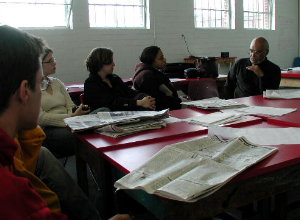
The
group speaks with Bob Moses, a famous SNCC leader from
the 1960s. Dr. Moses now directs a program focused on
teaching poor students algebra, headquartered in Jackson,
MS.
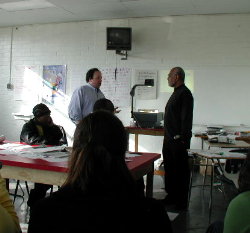
Joe
speaks with Dr. Moses.
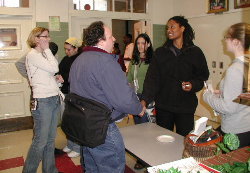
We
also got the opportunity to speak with Dr. Moses'
daughter.
Excerpt
from Steph Fitzwater's journal about Bob Moses:
. . . Wow,
those eyes. We had read about and heard about the Bob
Moses Stare. To actually experience it, along with simply
interacting with him, was absolutely incredible. He
insisted we sit in a circle. His body language was
wonderful, as he moved to face whomever he was
addressing. Then, he would look at you. He would look
into your eye and seemingly your soul as well. His gaze
was searching, looking to understand you, your question,
and everything about you all at once. He would ask you to
clarify your question in order to answer it as completely
as possible and also in avoiding any vagueness or hidden
meanings. He was definitely not a leader in the
traditional sense. Rather, he was a teacher. After our
interview with him, he had to leave abruptly to meet with
a parent. He did not stay to pose for pictures so that he
could attend to his obligations as a teacher. Bob Moses,
what an entity.
As we left Lanier, we talked to some of the students. As
we had entered the building, everyone had been staring at
us, but now, we were actually talking with the students.
A group had come back to school after hearing that a
there were some people in from out of town. They were all
genuinely interested and curious, especially with such a
racially diverse group as we were. Before then, I'd known
that we stuck out and that we were obviously a
unique-looking and -seeming group, but only then did it
truly sink in. ...
Excerpt
from Jenny Nathan's journal about Bob Moses:
. . . I can only describe Bob Moses as perfect. Very
soft-spoken, very intense . . . we talked with him in his
classroom at Lanier High School in Jackson, Mississippi
where he is a math teacher. Dr. Moses isn't a principal
or superintendent-he's a math teacher. When he had to end
our visit abruptly to meet with a parent, I didn't mind.
He was just doing his job. He has ALWAYS just done what
needed to get done, and look at what he has accomplished!
And he has an amazing mind, and he relentlessly tries to
understand anything you ask him, and when he looks at
you, straight in the eye-it's true what Margaret Block
said - it's like he's looking right into your soul. In
that room with Bob Moses, I felt greatness in a way that
I don't know that I ever had. And I didn't get any
pictures, but that too seemed right . . . Bob Moses
smiling in a photo would almost have demeaned his
status-I feel like he's above celebrity status. And there
he is, teaching math every day in a high school in
Mississippi.
David
Dennis
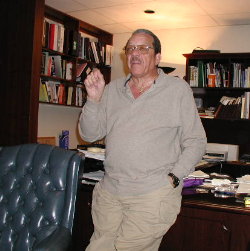
Speaking
with David Dennis.
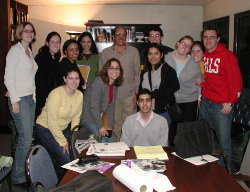
The
group poses with Mr. Dennis.
Back to main page
Excerpt
from Rachel Fisher's journal about David Dennis:
. . . After
hearing from Bob Moses, we met with Dave Dennis, who is
my favorite activist so far. (It sounds so silly to
"have a favorite activist," they are not like
rockstars or baseball players) He was the perfect balance
of a charismatic optimist, and a blunt realist. He told
us like it is and like it was back in the day, yet he was
one of the few people we've heard from so far that was
optimistic about our generation. He was encouraging
without being cock-eyed and I really appreciated it. He
also talked about educational empowerment AS political
empowerment, which made so much sense. He talked about
sacrifice. Something that his generation has and ours
does not is a sense of sacrifice. As a whole, most of us
care most about ourselves and our resumes and living a
happy life with a white picket fence, etc. than we do
about standing up for what's right. Although some great
people do make sacrifices. For example, my friend Diego
missed about 30 days of school 2 years ago because he was
sitting in the Michigamua tower - something that most
people wouldn't do. His grades suffered and it affected
his law school choices, but he didn't care because he saw
that in the grand scheme of things that his sacrifice was
worth it. There is nothing I respect more than that. . .
.
|








